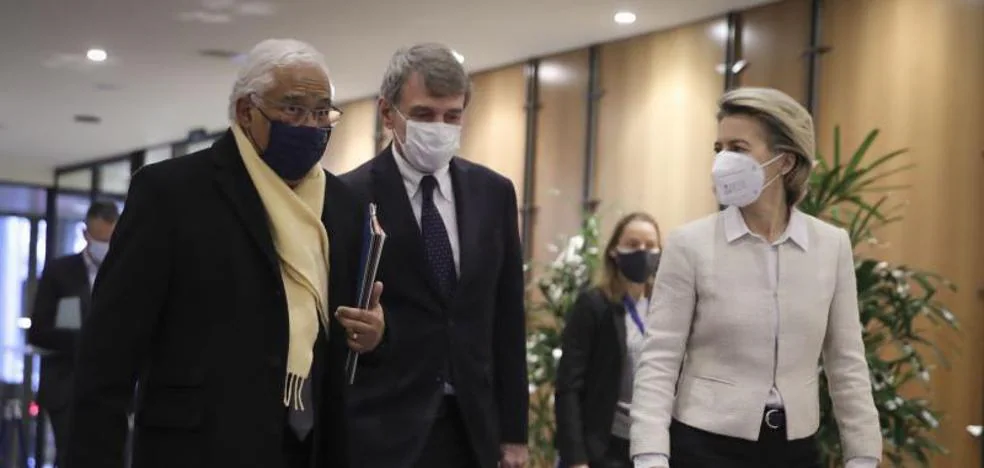“We already have the vaccine to protect health, now we urgently need the vitamin for economic recovery.” With this metaphor, the Portuguese president, Antonio Costa (his country holds the rotating presidency of the EU) on Friday urged the States to accelerate the ratification process in their respective parliaments of the decision of own resources or, whatever The same, the unanimous authorization for the European Commission to launch a debt issue to the markets to cover the 750,000 million of the recovery fund.
A money that would flow in the form of loans and direct aid “at the beginning of summer”, he assured. The Portuguese president, accompanied by the president of the European Commission, Ursula von der Leyen, and the president of the European Parliament, David Sassoli, launched that message of urgency in the context of the formal signing of the legislative agreement on the rules of the Recovery Mechanism and Resilience, the fundamental pillar of that great reconstruction plan, which has an allocation of 672,500 million.
Today only half a dozen countries (including Portugal, Croatia, Cyprus or Slovenia) have fulfilled this requirement. Spain is expected to do so at the end of March and the goal is for everyone to have it completed by early April. “As soon as the ratification (of the Twenty-seven block) is obtained, the Commission will go to the market, collect money and disburse,” stressed Von der Leyen, who reiterated that the Executive will be able to make the first advance payment of 13% “immediately. By the middle of the year, we should be able to disburse the first funds already ”.
Spain, as the second most benefited country, receives transfers from the Mechanism in a percentage of 20.6% (69,528 million). With regard to loans, the availability of between 71,000 and 84,660 million is expected (it will depend on the request made by the different partners). And outside of the mechanism, although as part of the Next Generation, the country would benefit from another 12,426 million euros.
All states have to present investment and reform plans. Spain has delivered a draft that it completed a couple of weeks ago with the last two files (referring to the labor reform and the pension system). The commissioner responsible for the Economy, Paolo Gentiloni, assured on Thursday, during the presentation of the winter economic forecasts that, “we cannot give a complete evaluation. We are still working on certain details and figures with Spain. Cooperation (on the recovery plan) is on the right track, “he added, referring to the technical and political discussions (behind closed doors) that the Commission conducts directly with all the States so that these plans are oriented to key objectives for the Union as the green and digital transformation, in addition to not deviating from the biannual supervision of Brussels.
During this “historic” signing act in the European Parliament, as defined by its president Sassoli, the head of the Community Executive insisted on maintaining the goal of vaccination reaching 70% of the adult population by the end of next summer (he referred specifically as of September 21). He did not hide that possibly “new difficulties will arise in this way” (sound have been the disputes of his cabinet with pharmaceutical companies, especially AstraZeneca, due to the delay in the delivery of doses). And he advocated the reduction of regulatory approval times for new vaccines by the European Medicines Agency (EMA).
That the EU reaches this goal of 70% of immunized citizens is considered a key to meeting the latest economic projections of the European Commission itself, which point to recovery during the second half of the year and that, in the case of Spain , would place it at the head of Europe with GDP growth rates of 5.6 and 5.3% for this year and 2022, respectively
– .


